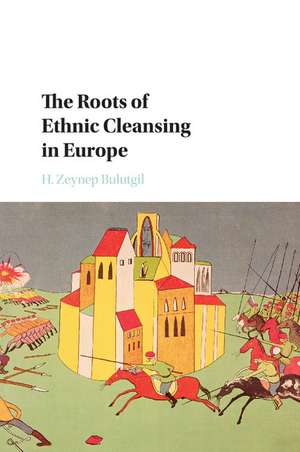The Roots of Ethnic Cleansing in Europe: Problems of International Politics
Autor H. Zeynep Bulutgilen Limba Engleză Paperback – 18 apr 2018
| Toate formatele și edițiile | Preț | Express |
|---|---|---|
| Paperback (1) | 283.41 lei 6-8 săpt. | |
| Cambridge University Press – 18 apr 2018 | 283.41 lei 6-8 săpt. | |
| Hardback (1) | 697.47 lei 6-8 săpt. | |
| Cambridge University Press – 14 sep 2016 | 697.47 lei 6-8 săpt. |
Din seria Problems of International Politics
-
 Preț: 238.60 lei
Preț: 238.60 lei -
 Preț: 200.13 lei
Preț: 200.13 lei -
 Preț: 227.61 lei
Preț: 227.61 lei -
 Preț: 224.24 lei
Preț: 224.24 lei -
 Preț: 159.18 lei
Preț: 159.18 lei -
 Preț: 251.27 lei
Preț: 251.27 lei -
 Preț: 205.41 lei
Preț: 205.41 lei -
 Preț: 252.21 lei
Preț: 252.21 lei -
 Preț: 247.41 lei
Preț: 247.41 lei -
 Preț: 229.56 lei
Preț: 229.56 lei -
 Preț: 197.90 lei
Preț: 197.90 lei -
 Preț: 332.68 lei
Preț: 332.68 lei -
 Preț: 319.99 lei
Preț: 319.99 lei -
 Preț: 282.48 lei
Preț: 282.48 lei -
 Preț: 226.17 lei
Preț: 226.17 lei - 11%
 Preț: 697.28 lei
Preț: 697.28 lei
Preț: 283.41 lei
Nou
Puncte Express: 425
Preț estimativ în valută:
54.24€ • 56.42$ • 44.78£
54.24€ • 56.42$ • 44.78£
Carte tipărită la comandă
Livrare economică 14-28 aprilie
Preluare comenzi: 021 569.72.76
Specificații
ISBN-13: 9781316501665
ISBN-10: 1316501663
Pagini: 232
Ilustrații: 8 b/w illus. 12 tables
Dimensiuni: 153 x 230 x 15 mm
Greutate: 0.35 kg
Editura: Cambridge University Press
Colecția Cambridge University Press
Seria Problems of International Politics
Locul publicării:New York, United States
ISBN-10: 1316501663
Pagini: 232
Ilustrații: 8 b/w illus. 12 tables
Dimensiuni: 153 x 230 x 15 mm
Greutate: 0.35 kg
Editura: Cambridge University Press
Colecția Cambridge University Press
Seria Problems of International Politics
Locul publicării:New York, United States
Cuprins
Introduction; 1. Theory; 2. Empirical implications I: cross-national test; 3. Empirical implications II: historical cases; 4. Empirical implications III: Bosnia-Herzegovina; 5. Negative and atypical cases in Europe; 6. Theoretical and empirical extensions - relative absence of ethnic cleansing in Africa; 7. Conclusion.
Recenzii
'The Roots of Ethnic Cleansing in Europe is an innovative contribution to the systematic study of mass violence. Using a variety of quantitative data, case studies from multiple world regions, and original theory, the book asks and answers a big question. As one of the only dedicated social scientific studies of ethnic cleansing, this book is a landmark that will command attention from scholars for years to come.' Scott Straus, University of Wisconsin, Madison
'The Roots of Ethnic Cleansing in Europe is the most systematic scholarly effort to date to understand one of the most terrible forms of violence facing humanity. Episodes of ethnic cleansing have ravaged Europe repeatedly over the last 100 years, killing millions of people and rendering tens of millions more refugees. Drawing on in-depth historical and statistical analyses, H. Zeynep Bulutgil locates the causes of these tragedies in territorial conflicts between states and in the nature of the social and political cleavages and hierarchies within states. In so doing, she points the way to policies that might render ethnic cleansing less common in the future.' Benjamin Valentino, Dartmouth College, New Hampshire
'By dint of meticulous research and methodical analysis, H. Zeynep Bulutgil has constructed an argument that is provocative and far-reaching in its implications. Calling into question common assumptions about the relationship between historical memory and inter-communal violence, Bulutgil articulates a powerful argument to the effect that ethnic cleansing is not so much dictated by the legacy of past conflicts as it is set off by the intersection between particular patterns of ethnic geography and warfare. This is a wide-ranging and methodologically rigorous comparative study that forces its readers to reexamine some of their deepest held conceptions.' Aviel Roshwald, Georgetown University, Washington, DC
'Bulutgil's innovative study examines the causes of ethnic cleansing, and why some regions are so much more prone to ethnic cleansing than others. Her fundamental and compelling point is that 'territorial revisions' alter the balance of power among groups within annexed territories that then unleash murderous dynamics. She finds that cross-cutting cleavages serve as barriers against ethnic cleansing, while interstate ethnic conflict facilitates ethnic cleansing by increasing salience of ethnicity relative to other cleavages. This important book revisits some older theories in comparative politics and ingeniously uses them to address a critical question. In sum, The Roots of Ethnic Cleansing in Europe combines sharp theoretical insight with great empirical material.' APSA European Politics and Society Section Best Book Award Committee
'The Roots of Ethnic Cleansing in Europe is the most systematic scholarly effort to date to understand one of the most terrible forms of violence facing humanity. Episodes of ethnic cleansing have ravaged Europe repeatedly over the last 100 years, killing millions of people and rendering tens of millions more refugees. Drawing on in-depth historical and statistical analyses, H. Zeynep Bulutgil locates the causes of these tragedies in territorial conflicts between states and in the nature of the social and political cleavages and hierarchies within states. In so doing, she points the way to policies that might render ethnic cleansing less common in the future.' Benjamin Valentino, Dartmouth College, New Hampshire
'By dint of meticulous research and methodical analysis, H. Zeynep Bulutgil has constructed an argument that is provocative and far-reaching in its implications. Calling into question common assumptions about the relationship between historical memory and inter-communal violence, Bulutgil articulates a powerful argument to the effect that ethnic cleansing is not so much dictated by the legacy of past conflicts as it is set off by the intersection between particular patterns of ethnic geography and warfare. This is a wide-ranging and methodologically rigorous comparative study that forces its readers to reexamine some of their deepest held conceptions.' Aviel Roshwald, Georgetown University, Washington, DC
'Bulutgil's innovative study examines the causes of ethnic cleansing, and why some regions are so much more prone to ethnic cleansing than others. Her fundamental and compelling point is that 'territorial revisions' alter the balance of power among groups within annexed territories that then unleash murderous dynamics. She finds that cross-cutting cleavages serve as barriers against ethnic cleansing, while interstate ethnic conflict facilitates ethnic cleansing by increasing salience of ethnicity relative to other cleavages. This important book revisits some older theories in comparative politics and ingeniously uses them to address a critical question. In sum, The Roots of Ethnic Cleansing in Europe combines sharp theoretical insight with great empirical material.' APSA European Politics and Society Section Best Book Award Committee
Notă biografică
Descriere
Brings together arguments focussing on domestic and international factors to offer a coherent theory of the causes of ethnic cleansing.
















